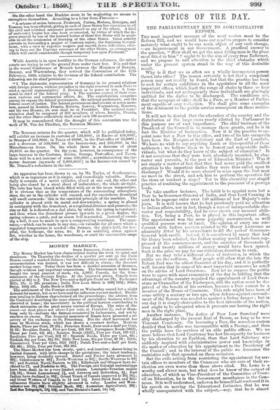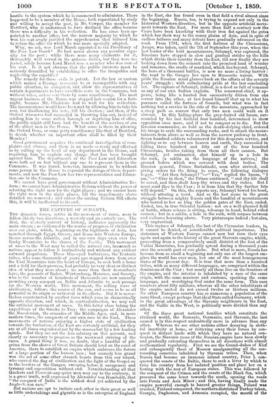TOPICS OF THE DAY.
THE PARLIAMENTARY KEY TO ADMINISTRATIVE' REFORM.
THE most important measure of the next session must be the Reform BM, and: we would' have our raiders prepare to consider maturely what ought to be one main object of any such change, —an improvement in our Government. A practical answer to the question, " How shall we get the most Litt-Ingram in the place most fitted to him." ? ought to be the aim of every true Reformer, and we propose to call attention to the chief obstacles which. under the present system stand in the way of this desirable- result.
Why is it -that we so often see a wholly incompetent person thrust into office? The reason certainly is not that a competent person may not readily be found, but that the praotice has been to seek for certain conditions in the appointees to all the most important offices, which limit the range of choice t* three or four individuals, and not unfrequently those individuals are glaringly unfitted for the duties to be discharged. The conditions are, that the occupant of office shall be a Peer, or a Member of Parlia- ment capable of easy reelection. 'We shall give some examples of the detriment to the public service consequent on these restric- tions.
It will not be denied that the education of the country and the distribution of the large sums yearly allotted by Parliament to this purpose are of vast importance. The chief business of tie President of the Council is to manage these grants, and he is inn fact the Minister of Instruction. Now it is the practice to ap- point none but a Peer to this office, and two of its late occupants. have been the Marquis of Salisbury and the Earl of Lonsdale. We have no wish to say anything harsh or disrespectful of these noblemen ; we believe them to be honest and respectable indi- viduals, but what do they know of the subject of education ? it not notorious that they were both absolutely unsuited, by cha- racter and pursuits, to the post of Education Minister ? Was it not simply a matter of fact that they had never paid the smallest attention to the important duties they were thus called upon ttr discharge ? Would it be more absurd to seize upon the first man we meet in the street, and ask him to perform the operation for- the stone or conduct a siege ? Yet to this absurdity our stupid' practice of confining the appointment to the possessor of a peerage leads, To take another instance. The habit is to appoint none.but a.
Peer to be Governor-General of India, and thus Lord Canning is sent to be -supreme ruler over 150 millions of her Majesty's sub- jects. It is well known that he had previously paid no attentions to Indian affairs, nor in fact, though a man of unimpeachable cha- racter and respectability, had he ever shown any unusual abili- ties. Yet, being a Peer, he is placed in this important office; The appointment was the more palpably unwarranted, as welP qualified persons were at hand. The opinion of every one con- versant with Indian matters pointed to Sir Henry Lawrence as' admirably fitted by his antecedents to fill the posbof Governor- General with credit. Indeed, it is considered by many that had' Sir Henry been selected, the Indian mutiny would have been sup- pressed' at the commencement, and the sacrifice of thousands of lives and twenty millions of money would' have been spared. Such is the price we pay for our ridiculous devotion to rank.
But we may take a different class of instances, in which the- public are the sufferers. Most people will allow that the late Si' Robert Peel was the ablest financier of his day, and it is perfectly- well known that in some of his most important measures he aotea' on the advice of Lord Overstone. Now let us suppose the public• were to agree with most economists of the day in holding that the. advantage of the country required the appointment of Lord Over- stone as Chancellor of the Exchequer, still the nation must be de- prived of the benefit of his services, because a Peer cannot be a member of the House of Commons. This rale might have been of some utility a century or two ago, when defence against encroach- ment of the Barons was needed as against a livino. danger ; but in our day it is simply obstructive to the best interests of the nations and ought to be abrogated when it prevents our having the right man in the right place. Another instance. The duties of Poor Law Seoretary were ably disoharged by the present Earl of Devon- so long as ho was g.
Viscount Courtenay. On becoming a Peer, the senseless custom decided that his office was incompatible with a Peerage, and thus the public loses the services of an able public officer. We no more believe that Lord Courtenay has lost his capacity for business by his elevation to an Earldom, than that Lord Salisbury was suddenly inspired with administrative power and knowledge in the matter of education by his appointment to the Presidency of the Council; and in the interest of the public we denounce the restrictive rule that operated on these occasions. But the evils arising from restricting the appointment for cer- tain offices to members of the Commons who are sure of their re- election are even worse than those above cited: Mr. Lowe is a worthy and clever man, but what does he know a the subject of education, of which as Vice-President of the Committee of Coun- cil' on Education, he is the Government mouthpiece in the Com- mons. It% well understood, and even he himself half confessed it in his speech on moving the Educational Estimates, that he was wholly unacquainted with the subject, —nay, that he is almost
hostile to the system which he is summoned to administer. There happened to be a member of the House, both capacitated by study and willing to accept the post, in Mr. Cowper, the member for Hertford, who is understood to have declined the office because there was a difficulty in his reelection. He has since been ap- pointed to another office, but the narrow majority by which he won his seat amply justified the apprehension that induced him to refuse the office for which he was more specially adapted. Why, we ask, was Lord March appointed to the Presidency of the Poor Law Board ? He had never shown any peculiar capa- city for the post ; while there were many claimants for it, thoroughly well versed in its arduous duties, but they were re- jected, solely because Lord March was a member who was sure of his seat. Is it not obvious that the public interests must be seriously damnified by establishing in office the incapables and neglecting the capables ? The remedy for these evils is patent. Let the law or custom which makes a Peerage necessary to or incompatible with any public situation, be abrogated, and allow the representatives of certain departments to have ex-officio seats in the Commons, but without votes, unless sent there by some constituency. The most urgent business of the House was stopped last session for a fort- night, because Mr. Gladstone had to wait for his reelection. The inconvenience would have been met by allowing him to take his seat, but disallowing his vote, till his election ; and then, if the Oxford wiseacres had succeeded in throwing him out, instead of sending him to some rotten borough or depriving him of office, the public might still have had the benefit of the services of one of the ablest men in the House. What sense is there in allowing the Oxford Dons, or some petty constituency like that of Hertford, to decide whether an important office shall be filled by their Member !
Good government requires the continual investigation of com- plaints and abuses, and there is no mode so ready and effectual as by calling up the head of any department in the House, and requiring him to explain any charge that has been brought against him. The departments of the Poor Law and Education were both set on foot without any one to represent them in the Commons. It was found, however, inconvenient to be without some person in the House to expound the doings of these depart- ments, and now the Poor Law has two representatives and Educa- tion one in the Commons.
We cannot have good government without Administrative Re- form ; we cannot have Administrative Reform without the power of selecting the right men for the right places ; and we cannot have the right men in the right places, till the impediments above detailed are removed ; and unless the coming Reform Bill effects this, it will be ineffectual to its end.



























 Previous page
Previous page